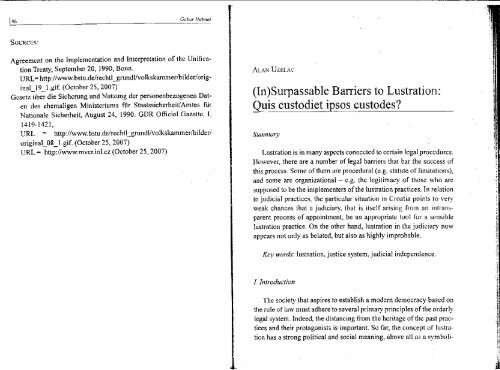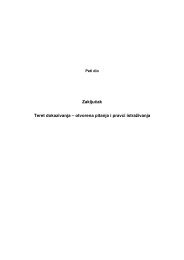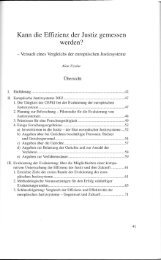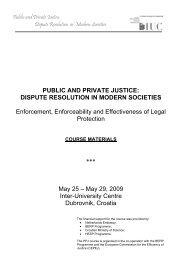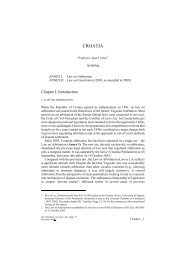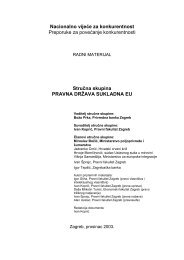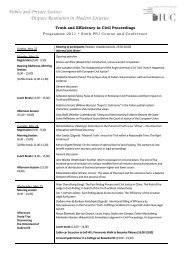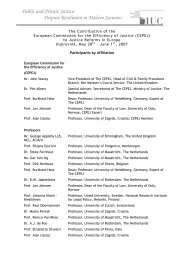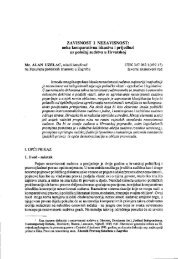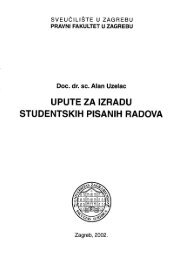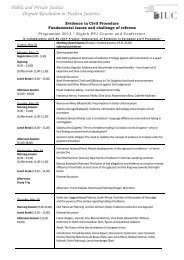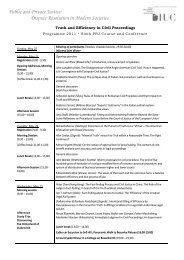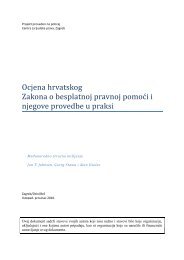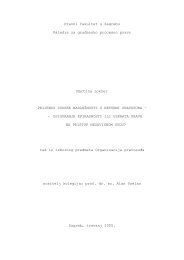(In)Surpassable Barriers to Lustration: Quis custodiet ... - Alan Uzelac
(In)Surpassable Barriers to Lustration: Quis custodiet ... - Alan Uzelac
(In)Surpassable Barriers to Lustration: Quis custodiet ... - Alan Uzelac
You also want an ePaper? Increase the reach of your titles
YUMPU automatically turns print PDFs into web optimized ePapers that Google loves.
Iso A/an U:::elac<br />
lege is <strong>to</strong>day unders<strong>to</strong>od as one of the fundamental human rights. 9 To<br />
violate that fundamental human right in the name of the protection of<br />
fundamental human rights sounds at least contradic<strong>to</strong>ry, if not absurd.<br />
Therefore, in many countries that have enacted lustration laws, such<br />
as Poland, Hungary, Czech Republic, Slovenia or Slovakia, the point<br />
of retrospective ( retroactive) application was often invoked in the<br />
constitutional review, and these laws were often facing the real risks<br />
of being pronounced as unconstitutional. The more radical variants<br />
of lustration legislation that provided possibility of raising criminal<br />
charges against members of former regime were rejected on constitutional<br />
grounds already in early 1990s.1O<br />
Some practices, such as <strong>to</strong>rture or murder, can still, without much<br />
twist in legal imagination, be construed as the practices which were,<br />
or at least should have been, prohibited also at the time when they<br />
are committed, notwithstanding that they were committed in the<br />
service of the old regime. Such practices, indeed, can and should be<br />
prosecuted. Now, the question is whether such prosecutions should<br />
, have any special shape and rules as those that are undertaken in the<br />
"regular", "non-Iustration" circumstances. Applying double standards<br />
for the same crimes may again, at least apparently, run the risk of<br />
violating the principle of non-discrimination that demands the same<br />
offences are treated in the same way. It seems that this was in fact the<br />
insurmountable difficulty for Central and East-European legisla<strong>to</strong>rs,<br />
9 On application of this principle in intcmationaJ criminal law see Werle, 2005: 32. This principle<br />
is also embodied in Art. 7 of the European Convention on Human Rights (no punishment<br />
without law). <strong>In</strong> the practice of the European Court of Human Rights in Strasbourg, it<br />
was held that Art 7 has not confined only <strong>to</strong> prohibiting the retrospective application of the<br />
criminal law <strong>to</strong> disadvantage of the accused. "It also embodies, more genera1ly, the principle<br />
that only the law can define a crime and prescribe a penalty (nullurn crimen. nulla poena sine<br />
lege) and the principle that the criminal law must not be extensively construed <strong>to</strong> a detriment<br />
of the accused, for instance by analogy." Kokkinakis v. Greece judgement of May 25, 1993<br />
(Series A no. 260-A, p. 22, par. 52).<br />
10 E.g. in 1992 the Hungarian Constitutional Court overturned the Act on the prosecutabllity<br />
of crimes not prosecuted for political reasons. The main argument was derived from the<br />
rule oflaw doctrine: the certainty of laws requires that the legislative authority should make<br />
laws which are clear, comprehensible and have a predictable (= non-retrospective) effect.<br />
See Constitutional Court Decision No. 11/1992 (111.5) AB. More in Dombach (1992) and<br />
Dillemmas (1992). More on this decision sec infra, in the context of the statute ofiimitation<br />
difficulties.<br />
(<strong>In</strong>)<strong>Surpassable</strong> <strong>Barriers</strong> <strong>to</strong> Lus/ration: <strong>Quis</strong> cus<strong>to</strong>diel ipsos cus<strong>to</strong>des? 511<br />
because virtually no serious attempts <strong>to</strong> organize some kind of special<br />
post-communist Nuremberg-style trials were noted. On the contrary,<br />
the "Iustration" was largely experienced as a surrogate for full-fledged<br />
criminal condemnation - it was limited <strong>to</strong> attacking the ability of current<br />
and possible office-holders <strong>to</strong> discharge their jobs (or apply for<br />
office).<br />
A typical model of a relatively successful method, by which a system<br />
of "transitional justice"" attempted <strong>to</strong> evade the pitfalls of retrospective<br />
application, was the one originally developed by the Polish<br />
Helsinki Committee in 1992", and subsequently adopted by several<br />
Central and Eastern European countries. According <strong>to</strong> this method, the<br />
public officials and the candidates for public offices would be required<br />
by law <strong>to</strong> state in a solemn written declaration whether they were,<br />
in the past, the members or collabora<strong>to</strong>rs of secret police or other<br />
oppressive communist services. If the declaration' would be affirmative,<br />
there would be no direct legal sanctions; however the political<br />
responsibility would most likely have sufficient negative impact for<br />
those who would admit it. If the lustration declaration would deny the<br />
past collaboration and if, subsequently, it would be proved that the<br />
declaration is untrue, this would - as a finding of a current, and not of a<br />
past offence - be a reason for moral and/or legal disqualification of the<br />
office-holder." But, even if such an approach does effectively respond<br />
<strong>to</strong> the objections of retrospective application, there are further barriers<br />
<strong>to</strong> the success of such a procedure.<br />
II For various concepts of "transitional justice" see: Teitel (2001); Kommers (1997); Kritz<br />
(1995).<br />
12 See: Rzeplinski, 1992:33.<br />
13 This procedure more or less corresponds <strong>to</strong> the provisions of the 1997 <strong>Lustration</strong> Act<br />
(Poland),
152<br />
b. The burden of time - issues relating <strong>to</strong> statute of limitations<br />
<strong>Alan</strong> lJ=efac<br />
Distancing from the past rarely happens in very short period of<br />
time, and the very fact that lustration is still a hot political and legal<br />
issue now, almost two decades after the faB of the past regime, demonstrates<br />
that we often have <strong>to</strong> deal with the events and offences<br />
that happened quite a long time ago. 14 <strong>In</strong> this connection, two types of<br />
difficulties are arising.<br />
The one difficulty is connected <strong>to</strong> the statute of limitation rules.<br />
Here, again, we have <strong>to</strong> deal with the issue of retrospective application<br />
of norms, but in a different fonn. Namely, the "pure" retrospective<br />
laws invent new crimes and allow criminal charges for actions<br />
that were, at the time when they were committed, not criminalized.<br />
But, a lot of offences (e.g. murder, fraud or theft) were, at the time<br />
when they were committed, described as criminal, but in the course<br />
of time the prosecution for them was time-barred, because the prescribed<br />
statute oflimitations periods have expired. Now, if somebody<br />
was, for political reasons not charged for a murder committed several<br />
decades ago (e.g. because they were political activists of Communists<br />
party who crushed the 1956 Revolution in Hungary), most likely the<br />
"normal" legal rules would not allow the prosecution for such a crime<br />
any more.<br />
Although statute of limitation rules are not something that is regarded<br />
as sacrosanct, in modern legal orders they have an important<br />
place, in particular because they contribute <strong>to</strong> legal certainty. They<br />
are also regarded <strong>to</strong> be an element of substantive law. When statute of<br />
limitation period expires, it cannot generally be revived and even the<br />
extension of the limitation period can be viewed as an attempt <strong>to</strong> retrospectively<br />
change the law. <strong>In</strong> any case, ignoring the statute of limitations<br />
is something that violates the fundamental principle of the rule of<br />
14 <strong>In</strong> Hungary, e.g. the his<strong>to</strong>ric events that triggered most of the lustration efforts that happened<br />
rumost 50 years ago, imminently after the crash ofthe Hungarian Revolution of 1956, during<br />
the wave of oppression by the Soviet-installed government. <strong>In</strong> the post-Yugoslav states and<br />
some other post-communist countries, the animosities have sometimes even deeper roots,<br />
and are connected <strong>to</strong> the affiliation during the World War II.<br />
(<strong>In</strong>)<strong>Surpassable</strong> <strong>Barriers</strong> <strong>to</strong> <strong>Lustration</strong>: <strong>Quis</strong> cus<strong>to</strong>diet ipsos cus<strong>to</strong>des?<br />
law: the principle ofiegality. This was exactly the point for which the<br />
Hungarian Constitutional Court found the 1991 law that attempted <strong>to</strong><br />
restart the expired Statute of Limitations for selected crimes committed<br />
between 1944 and 1990 <strong>to</strong> be unconstitutional." The Court stated<br />
that extension of the statu<strong>to</strong>ry limits were unconstitutional in various<br />
forms, because it violated the requirement of certainty and predictability<br />
of legislation. 16<br />
c. The burden of time - evidentiary difficulties<br />
The other difficulty that arises when we deal, exceptionally, with<br />
the crimes that were committed before several decades, is connected<br />
with the taking of evidence. The rules of evidence in legal proceedings<br />
are usually quite strict, and demand high standard of proof for the<br />
demonstration of guilt. If these high standards of proof are not met,<br />
regularly the result should be dismissal: ac<strong>to</strong>re non probante. reus absolvitur.<br />
The further we are from the disputed events, the higher is the<br />
likelihood that it will be extremely difficult, if not impossible, <strong>to</strong> reach<br />
the high evidentiary requirements, such as e.g. "beyond reasonable<br />
doubt" standard required for convictions for crime. I'<br />
One might ask why in such cases other legal procedures, with<br />
lower thresholds for evidence, but also with lesser consequences (e.g.<br />
dismissal from public offices or a ban from holding a public office) are<br />
not an option. <strong>In</strong>deed, some of such attempts were noted. Yet, it might<br />
not be compatible with the principles of the rule oflaw if we are not<br />
15 See Hungary: Constitutional Court Decision on the Statute of Limitations No. 20861 N1991/14<br />
(March 5, 1992), reprinted in 2 Transitional Justice, at 629.<br />
16 Admittedly, in a later decision the Court approved the amended legislation, but only insofar<br />
it dealt with the prosecution of the crimes that would, under intemationallaw, not fall under<br />
statute of limitations, such as war crimes or crimes against humanity. See Decision of the<br />
Constitutional Court No. 5311993 (X.l3) AB. See also: Ellis. 1996: 183-184.<br />
17 It is ruso important <strong>to</strong> observe that the evidentiary standard "beyond reasonable doubf',<br />
developed in the Anglo-American jurisprudence as the concept of criminal law, in the<br />
Continenta1 Europe (as a standard of "certainty") applies also <strong>to</strong> civil litigation. See more in·<br />
Shapiro, 1993.
<strong>Alan</strong> <strong>Uzelac</strong><br />
fundamental paradoxes that are related <strong>to</strong> the personal element of the<br />
lustration practices.<br />
b. Judiciary and "wild lustration ": the example a/Croatia<br />
From this point on, we would continue with the further organizational<br />
difficulties that are related <strong>to</strong> the current trends in the implementation<br />
of the constitutional principle of the separation of powers. The<br />
main arguments will be related <strong>to</strong> judicial branch of government, and<br />
will develop both on the general level, as well as on the level of the<br />
concrete example - the example of judicial reform in Croatia.<br />
As Franz Neumann claimed, independent and impartial judiciary is<br />
the irreducible minimum of democracy (Neumann, 1974:53). Therefore,<br />
the lustration among legal professionals, above all among judges<br />
and state prosecu<strong>to</strong>rs, should have a special significance. But, such a<br />
process is particularly difficult and sensitive. <strong>In</strong> this process, the same<br />
instruments that are designed <strong>to</strong> be protec<strong>to</strong>rs of the rule of law may<br />
become their opposite.<br />
This happened, e.g. with the constitutional process of appointment<br />
of judges and prosecu<strong>to</strong>rs in Croatia in the 1990s, what is particularly<br />
visible on the practice of the body that was due <strong>to</strong> appoint and dismiss<br />
judges, the State Judicial Council. Designed in the Constitution as a<br />
body of professional au<strong>to</strong>nomy in 1991, this body was not appointed<br />
for five years, and started <strong>to</strong> operate only in 1996. <strong>In</strong> the preceding<br />
five years, a process of "silent lustration"" was happening, and many<br />
of the judges and prosecu<strong>to</strong>rs were forced <strong>to</strong> leave their judicial posts,<br />
but rarely for legitimate reasons, and rarely with a clear explanation.<br />
However, more importantly, when the new body, the State Judicial<br />
28 The term of "silent lustration" implies, W1like the concept of "wild lustration" which happened<br />
in other Central European countries (Williams, Fowler, Szczerhiak, 2005:32) that<br />
dismissal of those who were regarded "inappropriate" happened without clear explanations,<br />
sometimes even without any explanation. Common <strong>to</strong> both is that they were "based on dubious<br />
evidence and seen <strong>to</strong> be politically motivated and deeply disruptive and damaging <strong>to</strong><br />
public life".<br />
(<strong>In</strong>jSurpassabie <strong>Barriers</strong> <strong>to</strong> <strong>Lustration</strong>: QUis ellS<strong>to</strong>diet ipsos ellS<strong>to</strong>des? .<br />
Council, over<strong>to</strong>ok the process of appointment, it became instantly<br />
apparent that it would not change the course of events. On the. contrary,<br />
the State Judicial Council, a body composed by a maJonty of<br />
judges, yet those appointed by political majority of the national Parliament,<br />
proved <strong>to</strong> be even more disastrous in its activity than the preceding<br />
silent political chistka. Already its first appointments confirmed<br />
the judicial posts of several controversial judicial figures with a his<strong>to</strong>ry<br />
of political subordination, while dismissing some of those who<br />
were the true heroes of judicial competence and independence. 19 As<br />
a <strong>to</strong>pical example, the judge who had the most of public trust, and<br />
was the best candidate for the President of the Supreme Court, the<br />
late judge Vladimir Primorac, was at that point dismissed from the<br />
Supreme Court. Judge Primorac, who had a his<strong>to</strong>ry of straight and upright<br />
decisions in the times of socialism, for what he was then forced<br />
<strong>to</strong> leave the judiciary, was again "Iustrated" precisely for his overly<br />
independent and upright stature and opinions.'o His uncompromising<br />
standing and independence was viewed as a threat <strong>to</strong> the monolithically<br />
unity of powers required at that point by the President Franjo<br />
Tudjman. It is only <strong>to</strong>o paradoxical that his dismissal was undertaken<br />
by the body that was alleged <strong>to</strong> be the body of professional au<strong>to</strong>nomy<br />
and independence of judicial branch of government, and that he, while<br />
banned again from judicial ranks, was forced <strong>to</strong> be involved in politics<br />
and subsequently was appointed as oppositional MP in the Croatian<br />
Parliament (Sabor).<br />
After the death of President Tudjman and res<strong>to</strong>ration of the balance<br />
of political powers, the political elites started <strong>to</strong> take judicial independence<br />
more seriously, not because they liked it, but because centers of<br />
political powers were not any more as strong and influential as in the<br />
1990s." This affected also the operation of the State Judicial Council.<br />
This body, slightly reformed, now is less directly interlinked and sub-<br />
29 See in more detail in <strong>Uzelac</strong>, 2000; <strong>Uzelac</strong>, 1995.<br />
30 His opinions can he best evaluated from his own works - see Primorac, 2000; more on<br />
Primorac in Kola, 2001.<br />
31 On initiaJ attempts <strong>to</strong> re<strong>to</strong>rm the process of appointment of judges see more in <strong>Uzelac</strong>,<br />
2002.<br />
59
<strong>Alan</strong> <strong>Uzelac</strong><br />
ordinated <strong>to</strong> particular political parties or holders of political powers.<br />
However, it has not radically improved the process of appointment,<br />
in particular the criteria for professional competence and ability. As a<br />
body of professional au<strong>to</strong>nomy, which represents the judicial officials<br />
that are the result of the intransparent appointment process of 1990s,<br />
the State Judicial Council now operates as a lobbying machine and an<br />
instrument of status quo in jUdiciary. <strong>In</strong>stead of the telephone calls of<br />
particular politicians, the appointment of judges is now influenced by<br />
telephone calls of colleagues and relatives, and the success of lobbying<br />
and links <strong>to</strong> particular members of State Judicial Council. On the<br />
side of the responsibility, the State Judicial Council was so far not able<br />
<strong>to</strong> establish any clear and resolute criteria. On the contrary, by its very<br />
slowness and irresoluteness, it had sent a message that it conceives<br />
judicial independence as the lack of their responsibility. This has contributed<br />
<strong>to</strong> the public criticisms of judiciary, and ever louder voices<br />
that speak of the current judges in Croatia as "holy cows", "protected<br />
animals", or, even worse, "the war profiteers".<br />
The final paradox in this context is the fact that malfunctioning of<br />
jud iciary is nowadays in Croatia the <strong>to</strong>pic no. I in the accession process<br />
<strong>to</strong> the EV." The chapter on judiciary and human rights is among<br />
all chapters the one which is at the earliest stage, and the one that will<br />
most likely be closed last." Therefore, the reforms, including the reforms<br />
of the process of judicial appointment and discipline, are now<br />
sorely needed. But, every move <strong>to</strong> improve the personal composition<br />
of the judicial professionals in Croatia is now being viewed within the<br />
members of the judiciary as an attack on the judicial independence and<br />
the rule of law. And, even the international community, including the<br />
EU bodies, is sending the twofold signals, advocating at the same time<br />
judicial reforms, but also judicial independence, including the support<br />
32 See more in <strong>Uzelac</strong>, 2006.<br />
33 Opening the accession negotiations, the European Commission found that "citizens rights in<br />
Croatia are ... not yet fully protected by the judiciary" (Opinion, 2004: 16); two years later,<br />
it was found that "reform is at an early stage and the judicial system continues <strong>to</strong> suffer fCOOl<br />
severe shortcomings" (Progress report, 2006:8). It is expected that this finding will not be<br />
considerably altered in the report for 2007.<br />
(<strong>In</strong>)<strong>Surpassable</strong> <strong>Barriers</strong> <strong>to</strong> <strong>Lustration</strong>: Quts cus<strong>to</strong>diet ipsos cus<strong>to</strong>des? 61 I<br />
for professional bodies such as the State Judicial Counci!."<br />
IV Concluding remark<br />
Therefore, in such a constellation, it is difficult <strong>to</strong> imagine what can<br />
come next in the context oflustration. Now, just as in the 1990s, there<br />
are moments when, in Central and Eastern European countries, lustration<br />
seems desirable, but elusive. To use the words ofImmanuel Kant,<br />
lustration seems <strong>to</strong> be "indispensable, yet impossible mission". Maybe<br />
we should continue <strong>to</strong> be realistic, and therefore continue <strong>to</strong> demand<br />
the impossible. Or else - in the quest for justice, the time elapsed<br />
might remain as only cure for the injustices of the past. <strong>In</strong> the words of<br />
popular culture: "The answer is blowin' in the wind".<br />
34 Onjudicial councils in Europe see Vrn;:cmans, Albers, 2003.


